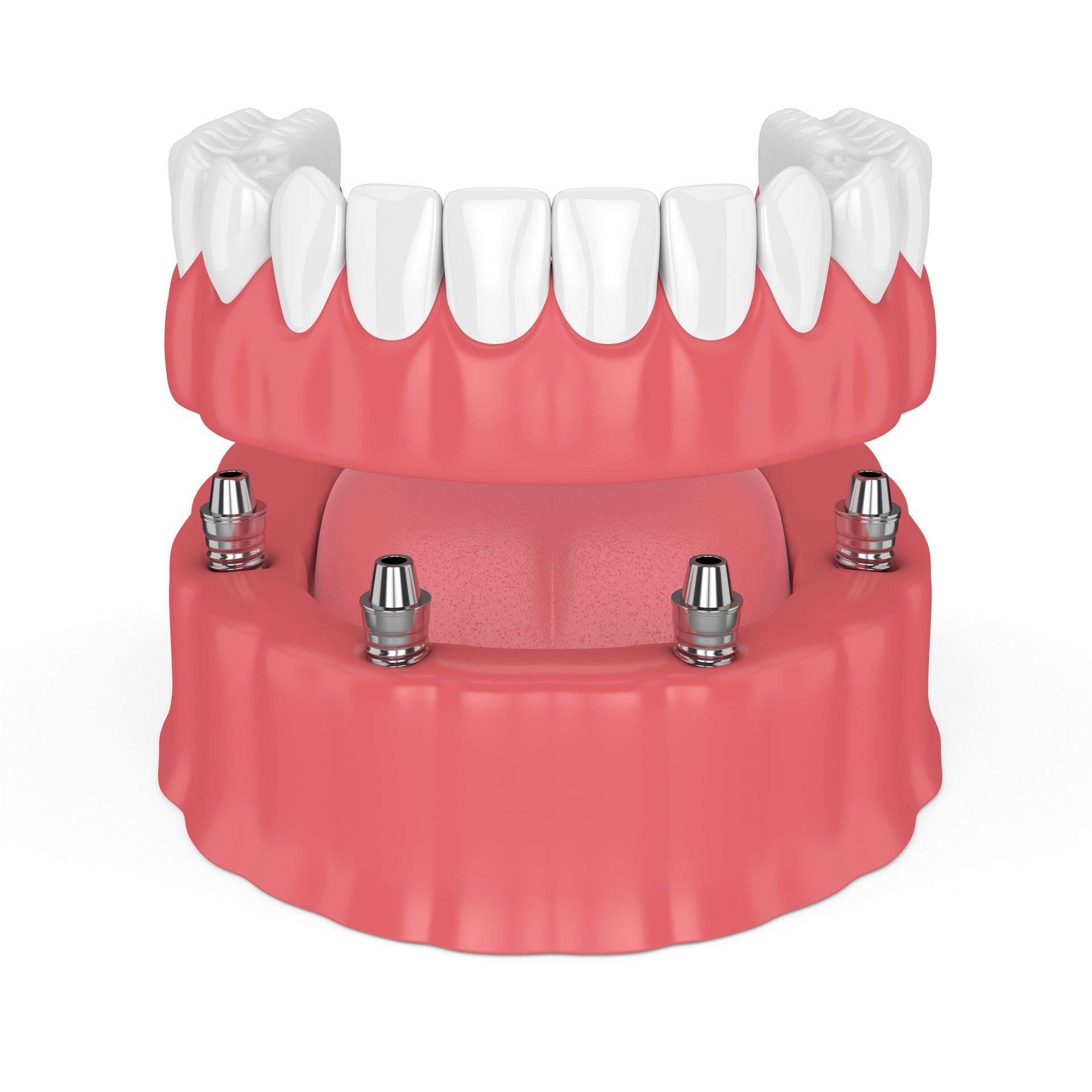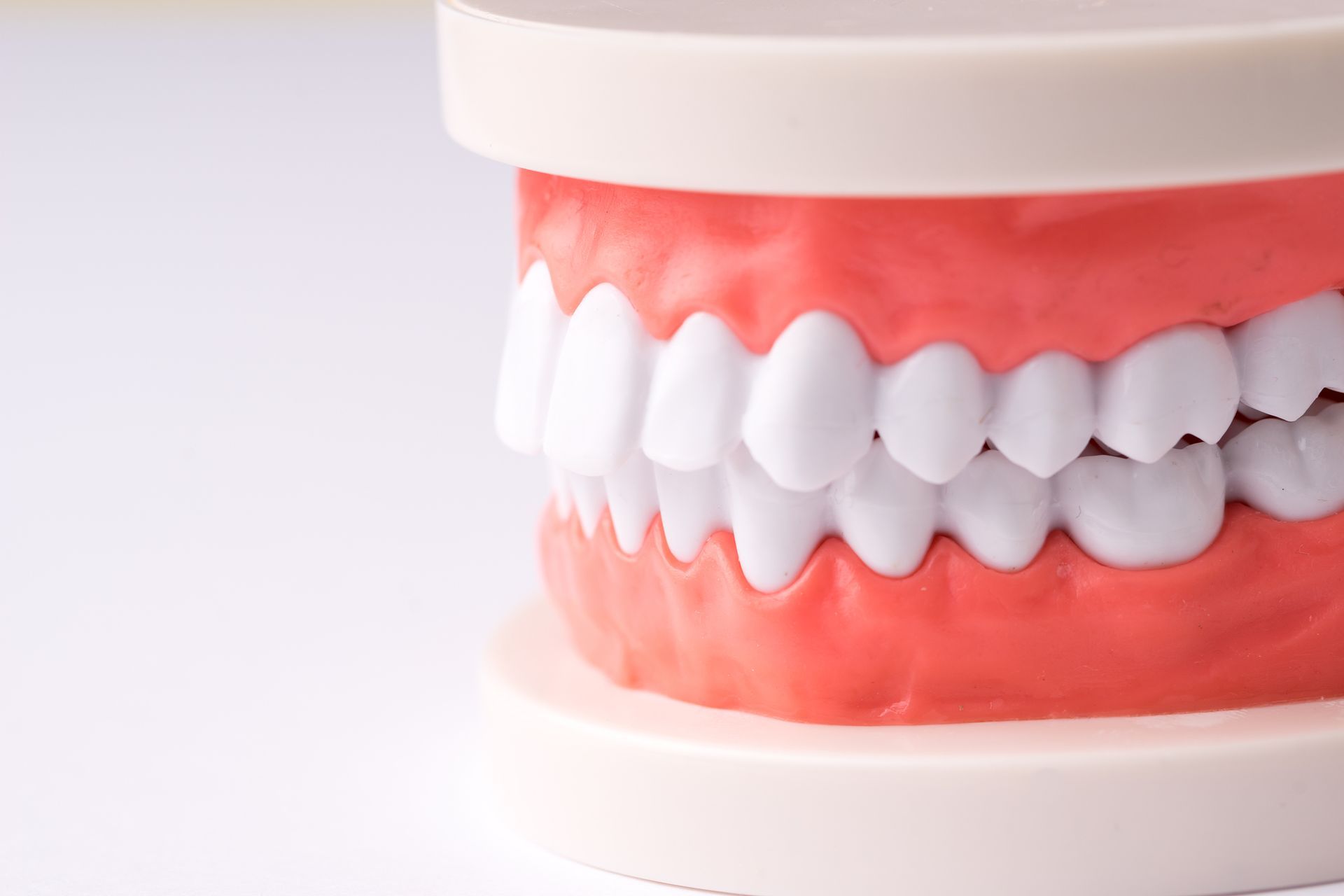Comparing Traditional Dentures to Implant-Retained Dentures
Are you considering dentures to replace your missing teeth? Discover the differences between traditional dentures and implant-retained dentures to make an informed decision. At Tulsa Teeth, our experienced denture specialists are here to guide you towards a brighter, more vibrant smile.
Key Takeaways
- Traditional dentures require adhesives and frequent adjustments.
- Implant-retained dentures offer a secure and natural-feeling alternative.
Contact Us
We will get back to you as soon as possible.
Please try again later.
- Dental implants are growing in popularity due to their numerous benefits.
- Traditional dentures are removable appliances that rest on the gums.
- Implant-retained dentures are supported by dental implants for enhanced stability.
What Are Traditional Dentures?
Traditional dentures are removable appliances used to replace missing teeth and surrounding tissues. There are two main types of traditional dentures: complete dentures and partial dentures. Complete dentures are used when all teeth are missing, while partial dentures are used to replace only some missing teeth. These dentures are designed to rest on the gums and may require the use of adhesives or suction to stay in place.
While traditional dentures have been a common solution for replacing missing teeth, they do come with their challenges. They can be bulky and may require frequent adjustments to ensure a proper fit. Additionally, traditional dentures may shift or slip out of place, making eating and speaking more challenging for some individuals.
If you are considering traditional dentures as a tooth replacement option, it is important to consult with a denturist who can provide guidance and help you make an informed decision based on your specific needs and preferences.
What Is an Overdenture?
An overdenture is a removable denture that is supported and anchored either by natural teeth roots or dental implants. It offers a more stable and secure alternative to traditional dentures, providing enhanced comfort and function.
There are two types of overdentures: tooth-supported overdentures and implant-supported overdentures. Tooth-supported overdentures are anchored to natural teeth that have been reduced in size and capped with metal caps. This provides stability and retention for the denture. On the other hand, implant-supported overdentures are supported by dental implants that are surgically placed into the jawbone. These implants act as artificial tooth roots, providing a strong foundation for the denture.
Implant-supported overdentures offer several advantages over traditional dentures. They provide better stability and retention, reducing the risk of denture movement or slipping. This allows for improved chewing and speaking ability. Additionally, implant-supported overdentures help preserve the jawbone by stimulating it, preventing bone resorption and changes in facial structure that can occur with traditional dentures.
| Tooth-Supported Overdentures | Implant-Supported Overdentures | |
|---|---|---|
| Support | Supported by natural teeth | Supported by dental implants |
| Stability | Relies on remaining natural teeth | Offers enhanced stability and retention |
| Chewing and Speaking | May have some limitations | Improved chewing and speaking ability |
| Jawbone Preservation | Not as effective in stimulating the jawbone | Helps preserve the jawbone and facial structure |
| Procedure | Requires preparation and capping of natural teeth | Requires dental implant surgery |
Overall, implant-supported overdentures offer superior stability, function, and jawbone preservation compared to traditional dentures. If you are considering denture options, consulting with a dentist specializing in implant dentistry can help determine if implant-supported overdentures are the right choice for you.
Comparing Implant-Supported Overdentures vs. Traditional Dentures
When it comes to choosing between implant-supported overdentures and traditional dentures, there are several factors to consider. One of the main advantages of implant-supported overdentures is their superior stability and comfort. Unlike traditional dentures that rely on adhesives and suction, implant-supported overdentures are anchored to dental implants, providing a secure fit that minimizes shifting or slipping out of place. This enhanced stability allows for a more natural-feeling and functional result, making eating and speaking easier and more enjoyable.
In terms of maintenance and care, both implant-supported overdentures and traditional dentures require regular cleaning and proper oral hygiene practices. However, implant-supported overdentures may require additional maintenance for the implants themselves. This includes regular dental check-ups and professional cleanings to ensure the implants remain in good condition. Traditional dentures, on the other hand, may require more frequent replacements or adjustments over time.
| Factors | Implant-Supported Overdentures | Traditional Dentures |
|---|---|---|
| Stability | High | Low |
| Comfort | Superior | Less comfortable |
| Maintenance | Regular care with additional maintenance for implants | Regular care with potential for more frequent replacements or adjustments |
As shown in the table above, implant-supported overdentures offer greater stability and comfort compared to traditional dentures. However, it is important to consult with a dentist to determine the best option based on individual needs, cost considerations, and long-term oral health goals. With proper care and maintenance, both implant-supported overdentures and traditional dentures can provide a functional and aesthetically pleasing solution for replacing missing teeth.
Bone Preservation with Implant-Supported Overdentures
One of the key benefits of implant-supported overdentures is the preservation of bone health. Unlike traditional dentures, which do not stimulate the jawbone, implant-supported overdentures help to maintain the health and volume of the jawbone. This stimulation is crucial for preventing bone resorption and changes in facial structure, which can lead to premature aging and a sunken appearance.
Implant-supported overdentures function by placing dental implants into the jawbone, providing a stable foundation for the denture. These implants mimic the natural tooth roots and stimulate the surrounding bone, preventing bone loss over time. This not only improves the overall function and stability of the denture but also helps to maintain the integrity of the jawbone.
By opting for implant-supported overdentures, patients can enjoy the benefits of a more secure and comfortable denture while simultaneously preserving their bone health. This preservation of the jawbone not only enhances oral health but also contributes to a more youthful and natural facial appearance.
Bone Preservation with Implant-Supported Overdentures
| Factors | Implant-Supported Overdentures | Traditional Dentures |
|---|---|---|
| Stability | High | Low |
| Comfort | Superior | Less comfortable |
| Maintenance | Regular care with additional maintenance for implants | Regular care with potential for more frequent replacements or adjustments |
As shown in the table above, implant-supported overdentures offer greater stability and comfort compared to traditional dentures. However, it is important to consult with a dentist to determine the best option based on individual needs, cost considerations, and long-term oral health goals. With proper care and maintenance, both implant-supported overdentures and traditional dentures can provide a functional and aesthetically pleasing solution for replacing missing teeth.
Bone Preservation with Implant-Supported Overdentures
One of the key benefits of implant-supported overdentures is the preservation of bone health. Unlike traditional dentures, which do not stimulate the jawbone, implant-supported overdentures help to maintain the health and volume of the jawbone. This stimulation is crucial for preventing bone resorption and changes in facial structure, which can lead to premature aging and a sunken appearance.
Implant-supported overdentures function by placing dental implants into the jawbone, providing a stable foundation for the denture. These implants mimic the natural tooth roots and stimulate the surrounding bone, preventing bone loss over time. This not only improves the overall function and stability of the denture but also helps to maintain the integrity of the jawbone.
By opting for implant-supported overdentures, patients can enjoy the benefits of a more secure and comfortable denture while simultaneously preserving their bone health. This preservation of the jawbone not only enhances oral health but also contributes to a more youthful and natural facial appearance.
Contact us today at Tulsa Teeth to schedule an appointment with our skilled denturist and take the first step towards a brighter, more vibrant life. Rediscover the joy of a beautiful, functional smile with implant-supported overdentures. Call us at (208) 226-7721 now.
Cost Considerations for Traditional Dentures vs. Implant-Supported Overdentures
When considering denture options, cost is an important factor to take into account. Traditional dentures are generally more affordable upfront compared to implant-supported overdentures. However, it's essential to consider the long-term costs and benefits associated with each option.
Traditional dentures may seem like a cost-effective choice initially, but they may require frequent replacements or adjustments over time. These additional expenses can accumulate and potentially surpass the initial cost of implant-supported overdentures. It's important to keep in mind that traditional dentures can be bulkier and less stable compared to their implant-supported counterparts, which may lead to discomfort and decreased confidence.
| Cost Considerations | Traditional Dentures | Implant-Supported Overdentures |
|---|---|---|
| Initial Investment | Lower | Higher |
| Long-Term Durability | May require frequent replacements or adjustments | Durable with proper care and maintenance |
| Stability and Comfort | Less stable and may cause discomfort | Enhanced stability and improved comfort |
| Bone Preservation | No stimulation, potential bone loss | Stimulates jawbone, preserves bone health |
In summary, while traditional dentures may have a lower initial cost, implant-supported overdentures offer superior stability, comfort, and oral health benefits in the long run. When considering the overall value and quality of life improvements, implant-supported overdentures can be a more cost-effective choice. It is recommended to consult with a denture specialist to discuss the specific costs and benefits related to your individual needs and circumstances.
Deciding Between Traditional Dentures and Implant-Supported Overdentures
Choosing between traditional dentures and implant-supported overdentures is an important decision that requires careful consideration. Each option has its own set of advantages and considerations, and it's essential to evaluate your individual needs and preferences. To help you make an informed choice, let's examine the key factors to consider when deciding between traditional dentures and implant-supported overdentures.
- Comfort and Stability: One of the primary concerns when choosing dentures is comfort and stability. Traditional dentures rely on adhesives and suction to stay in place, which may cause discomfort and insecurity. On the other hand, implant-supported overdentures are securely anchored to dental implants, providing a stable and natural feel. They eliminate the worry of dentures slipping or shifting while eating or speaking, offering enhanced comfort and confidence.
- Maintenance and Lifespan: Maintenance and lifespan are another significant consideration. Traditional dentures require regular adjustments and may need replacement over time due to wear and changes in the mouth's structure. Implant-supported overdentures, however, are more durable and typically have a longer lifespan. While they may require occasional adjustments, the implants provide stability and prevent bone loss, contributing to their longevity.
- Cost and Affordability: Cost is often a deciding factor when choosing dentures. Traditional dentures tend to have a lower upfront cost, making them more accessible for some individuals. However, it's important to consider the long-term costs as well. Traditional dentures may require frequent adjustments, relines, or replacements, which can accumulate expenses. Implant-supported overdentures, although initially more expensive, offer improved longevity and prevent bone loss, potentially making them a more cost-effective option in the long run.
Take the first step towards a brighter, more vibrant life. Contact us today to schedule an appointment with our skilled denturist. Your new smile awaits. Contact Tulsa Dentures at (208) 226-7721 and rediscover the joy of a beautiful, functional smile.
The Benefits of Implant-Supported Dentures
Implant-supported dentures offer numerous benefits over traditional dentures, making them an ideal choice for individuals seeking quality dentures and reliable denture implants in Tulsa. Here are some of the key advantages:
- Enhanced Stability and Comfort: Unlike traditional dentures that can shift or slip, implant-supported dentures are securely anchored to dental implants, providing a stable and comfortable fit. This prevents discomfort while eating, speaking, or engaging in social activities.
- Natural-Looking and Functional: Implant-supported dentures closely resemble natural teeth in both appearance and function. They are custom-made to fit your mouth perfectly, enhancing your smile and restoring your ability to bite and chew with ease.
- Durability and Longevity: With proper care and maintenance, implant-supported dentures can last for many years, making them a long-term investment in oral health. Unlike traditional dentures that may require frequent replacements or adjustments, implant-supported dentures offer enhanced durability.
For individuals seeking denture replacement in Tulsa, implant-supported dentures can significantly improve their overall quality of life. Whether you have lost all your teeth or multiple teeth, implant-supported dentures provide a reliable and permanent solution that can boost your confidence and restore your oral function.
Take the first step towards a brighter, more vibrant life. Contact us today to schedule an appointment with our skilled denturist. Your new smile awaits. Contact Tulsa Teeth at (208) 226-7721 and rediscover the joy of a beautiful, functional smile.
Conclusion
Choosing between traditional dentures and implant-supported overdentures is a personal decision that should be made in consultation with a dentist. Understanding the differences and weighing the benefits and drawbacks of each option is crucial for making an informed choice. Whether you opt for traditional dentures or implant-supported overdentures, the goal is to restore your smile and regain confidence in your oral health.
Take the first step towards a brighter, more vibrant life. Contact us today to schedule an appointment with our skilled denturist. Your new smile awaits. Contact Tulsa Teeth at (208) 226-7721 and rediscover the joy of a beautiful, functional smile.
You might also like
Denture Clinics Of Tulsa Blog & News
Book a Service Today
We will get back to you as soon as possible
Please try again later
Flash Those Beautiful Smiles!
Let our professional dentists helps your fill in the gaps inside your mouth. Don't be afraid to invest on your teeth, boost your confident with a smile.

Affordable Dentures & Implants from Tulsa's #1 Rated Denture Clinics! Call Today For an Appointment.
Navigation
Services
Disclaimer: www.tulsateeth.com is a free service to assist users in connecting with
local healthcare providers. www.emergencydentalboise.com is not a doctor’s office nor a doctor referral service nor is it a substitute for visiting a doctor. Nothing contained on or offered through this site should be
construed as medical advice and should not be relied upon for medical diagnosis or treatment.
www.tulsateeth.com does not endorse or recommend any participating Third-Party Healthcare Providers
that pay to participate in this advertising. All persons depicted in a photo or video are actors or
models and not doctors listed on www.tulsateeth.com.
All Rights Reserved | www.emergencydentalboise.com




